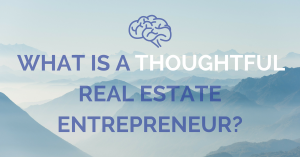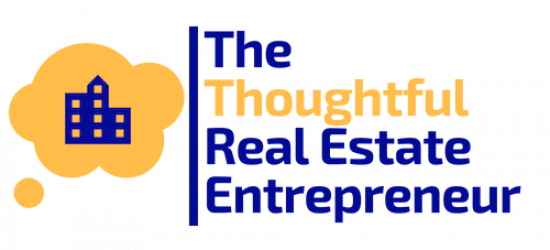 We are Thoughtful Real Estate Entrepreneurs. We write these articles for others who consider themselves to be–or want to become–Thoughtful Real Estate Entrepreneurs themselves. You, presumably, see yourself as a fellow Thoughtful Real Estate Entrepreneur (TREE).
We are Thoughtful Real Estate Entrepreneurs. We write these articles for others who consider themselves to be–or want to become–Thoughtful Real Estate Entrepreneurs themselves. You, presumably, see yourself as a fellow Thoughtful Real Estate Entrepreneur (TREE).
But what, exactly, is a Thoughtful Real Estate Entrepreneur?
Let’s take a few moments and examine what it means to be a TREE.
(After all, what’s more appropriate than for aThoughtful Real Estate Entrepreneur to sit and ponder thoughtfully about what it means to be thoughtful?)
Thoughtful: “Full of Thought”
It seems like in most contexts, “thoughtful” has become a synonym for “considerate.” As in, “it was so thoughtful that she bought me flowers when I was having a hard day.” While you can certainly simply look “thoughtful” up in the dictionary and see what it has to say, I believe that the definition is right in front of us: to be thoughtful, is to be “full of thought.”
I am clearly biased, but I sincerely believe thoughtfulness is one of the most admirable, respectable and useful attributes a person can have. When a person is thoughtful, they often exhibit several likable and enlightened traits. Here they are, in my humble opinion.
Awareness
To me, awareness is having a constant sense for what’s going on around you—from activity happening nearby, to the feelings of others, and to the context of a situation. Awareness means noticing and understanding these things; but more importantly, it means being sensitive to these observations and acting accordingly. When a person is highly aware, they are very perceptive, empathetic, and intuitive–they can feel the vibe of a person or a situation, an adjust accordingly. It’s like they have a million microscopic probes out in the world, taking readings and monitoring the contextual nuances of a situation.
Examples
Some real-life and real estate examples of awareness are:
- You need to bring up a topic with your spouse. Before you do so, you ask yourself the question, “if I put myself in her/his shoes, how is she/he likely to think and feel about this?” Then you adjust your approach to be sensitive to this, to make sure your message is presented in a way that will be well-received.
- You’re making an offer to buy a property, and you’re sitting in the seller’s living room. They ask you what you would plan to do with the place once you buy it, and before answering, you take a moment to recognize how they perceive their own property. If you’ve received clues that they consider their own property to very nice, and that they did a lot of the work themselves, you’re not going to talk about how you plan to renovate the whole property.
- You’re discussing a private loan with an individual, and before they even ask you to provide financial information about yourself, you hand them a binder with complete financials. You recognized that coming prepared with this information, rather than waiting for them to ask you for it, is a demonstration of your professionalism and experience, and sends the message–without them even opening the binder–that you have nothing to hide.
It may be helpful to note the opposite of awareness. Simply put, the opposite of awareness is obliviousness. Oblivious people are not sensing the world around them and acting accordingly; they are just acting as they see fit without consideration for the nuances of the context.
Self-Awareness
A closely related concept to awareness–but slightly different, at least in my opinion–is self-awareness. Self-awareness is the ability to consciously observe your own thoughts, feelings and emotions. It’s like you are able to step outside of your own body and look back at yourself with an observational approach. For that moment, you are two people–the subject and the observer–and the observer is able to identify and address the things they see are happening within the subject.
Sometimes I notice a small bit of anxious energy beginning to form in the bottom of my stomach. When I was younger and less self-aware, that bit of anxiety would just form and build subconsciously, and then I’d suddenly be upset and angry. As I’ve become more self-aware, this experience has moved from my subconscious to my conscious and now I’m able to track these feelings, “step outside myself” and address them.
Similarly, when I’m feeling irritated or stressed about something non-obvious (ie “I don’t know why, I’m just feeling grouchy”), as a self-aware person I’m pretty good at doing a diagnostic and figuring out what’s causing that irritation. This, then, allows me to address and resolve that particular issue.
Real estate entrepreneurship is truly a people business; the majority of value a real estate entrepreneur is able to create in the world (which is of course how they get paid) is created by creating agreement with other humans. Self-awareness is a critical component of being able to create agreement. When I’m being introduced to a new property owner (seller), tenant or lender, self-awareness allows me to analyze how I’m coming across to them, and to make adjustments to my appearance, language or approach so as to ensure I come across the way I want to.
Example
As a simple example, a very self-aware person will ask themselves questions like, “based on what I know about this seller, if I show up in a Carhartt worker’s jacket, will that make me feel more–or less–relatable to them?” Then, they will make the decision about which jacket to wear consciously. A less self-aware person will simply wear what jacket they want to wear, without considering how it may come across.
Multidisciplinary and Inter-Industry Thinking
Real estate investors love to study and learn, and are known for devouring all the real estate educational content they can find. But a thoughtful real estate entrepreneur doesn’t just study real estate; rather, they know that some of the most important lessons they can learn come from other topics, industries and fields. They read, listen and study outside their industry, and look for principles, ideas and lessons that–while presented in a different context–can be applied to their own life and business.
Examples
They read things like Inc. Magazine
, because they want to learn the stories of successful entrepreneurs in different industries, and ask one very important question: “how could I apply these principles of success in my own business?” For instance, a thoughtful real estate entrepreneur knows that the innovation a growing manufacturing or high-tech company is using successfully might just as well be applied to real estate, so they are always wanting to know what’s working for other entrepreneurs.
One of my personal favorite multidisciplinary resources is the author/blogger/podcaster Tim Ferriss. His books Tools of Titans: The Tactics, Routines, and Habits of Billionaires, Icons, and World-Class Performers
and Tribe of Mentors: Short Life Advice from the Best in the World
are both amazing resources that contain unbelievable amounts of wisdom from hundreds of very diverse high-performing, amazing people–from entrepreneurs to world-class athletes to entertainers and beyond.
Reflection on the Journey of Entrepreneurship
Thoughtful real estate entrepreneurs don’t see themselves as “real estate investors,” really. Rather, they see themselves first and foremost as entrepreneurs, who happen to be operating in the real estate industry.
That’s why a thoughtful real estate entrepreneur belongs to organizations like Entrepreneurs Organization and Strategic Coach. By being part of these organizations, they spend time with other entrepreneurs outside their industry, and intentionally learn many important universal entrepreneurial lessons…not just real estate-specific tactics.
A thoughtful real estate entrepreneur thinks deeply on their own experience and journey as entrepreneurs. There are things that all entrepreneurs experience, like anxiety, self-doubt, fear, the risk of feeling too high from wins and too low from defeats, lessons learned the hard way, and ongoing transformations. Thoughtful real estate entrepreneurs don’t just think about making money, they reflect on the journey of entrepreneurship, and work hard to learn as much about themselves, about life and about business as possible.
Strategic Thinking
In real estate, it can be easy to think very tactically:
- How do I get the financing for this house?
- How do I calculate the potential profit on a flip?
- What paperwork do you use to assign a wholesale deal?
And while we don’t ignore these tactical questions, a thoughtful real estate entrepreneur thinks well beyond these, to bigger picture questions and topics. On my mind as a thoughtful real estate entrepreneur are more strategic thoughts and questions, such as:
- How does a particular deal fit into my greater plan for the year?
- How do I find sellers I feel I can truly create value for? (see the next section for more on this)
- What is my global LTV (loan-to-value), DSCR (debt service coverage ratio) and cost of funds?
- Which kinds of deals do I need to do next in order to grow as an entrepreneur?
- What are the activities I personally do that add the most value? Conversely, what activities should I delegate to maximize my impact?
- What is the real estate portfolio I want to have in 10 years, and how is what I’m doing today contributing to achieving that goal?
When you think strategically, you think beyond the current deal, moment or challenge. You look at the bigger picture, seek to understand how the current situations fits into that bigger picture, and ask thought-provoking questions (which are sometimes difficult to answer).
Focus on Value Creation
A thoughtful real estate entrepreneurs knows that nobody–anywhere, in any situation, ever–makes money unless they create value for someone else. Instead of asking the question, “how can I make money?”, the thoughtful entrepreneur asks “for whom can I add the most value?” This question leads to a completely different thought process, and results in a different, more thoughtful and authentic approach to doing business.
In order to focus on value creation, one must have empathy–the ability to see things from someone else’s perspective. Once you can see something from another person’s perspective, you can better understand what would be valuable to them. Shifting from the myopic “me me me” perspective to one of empathy is a critical shift for thoughtful real estate entrepreneurs.
Examples
Here are two basic examples of value creation mentality in real estate:
- In a wholesale transaction scenario: Instead of asking “who can I assign this deal to for a profit?” a thoughtful entrepreneur asks, “which potential buyer would find the most value in the deal I’ve negotiated with the seller?”
- In a seller financing transaction scenario: Instead of asking “how can I persuade them to ‘carry a contract’?”, a thoughtful entrepreneur asks, “what kind of seller would most benefit from a continued income stream from selling their property?”.
Want to be a Thoughtful Real Estate Entrepreneur?
I hope you do! And even if you already are one, the journey of growing as a thoughtful real estate entrepreneur is endless. Join me in this ongoing conversation, and please share your own experiences.








Leave a Reply